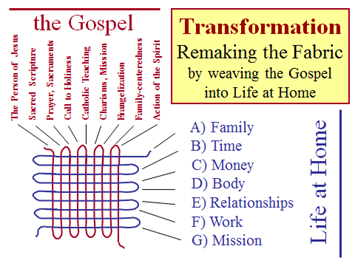Overview
New Leaven Method
The New Leaven Method
As the means of 'Totally-Integrated Formation', New Leaven groups would nominally meet four times for addressing each of eight "modules" of transformation. One recent group of participants has chosen to cover all the modules by convening twice a month for more than a year and a half. Others can tailor their schedules according to the availability of the group, taking for example one module in the winter and one in the spring and then, perhaps, another two spaced apart in the Fall. At each meeting, participants share a meal, join in praise & worship, watch a DVD on the transformation topic, and then discuss its personal application to everyday life in small groups of 8 to 10 persons. Close relationships in the small group are built up through training in prayer and holiness as the basis for tackling the transformation that the Spirit intends-per John Paul's admonition for trying "to be" before trying "to do". (NMI15)
Supported by trained pastoral guides and the growing intimacy of the small group in Christ, individuals undertake the serious work of weaving the Gospel and Catholic teaching into important threads of the lives they actually live at home, as per this key text from the John Paul's exhortation on the Laity, Christifideles Laici (CL):

"Without a doubt, a mending of the Christian fabric of society is urgently needed in all parts of the world. But for this to come about what is needed is to first remake the Christian fabric of the ecclesial community… (This will begin to happen, when the lay faithful…) know how to overcome in themselves the separation of the Gospel from life, to again take up in their daily activities in family, work, and society, an integrated approach to life that is fully brought about by the inspiration and strength of the Gospel." [CL 34]
Per this fabric metaphor we look for the horizontal threads of everyday life (see the figure, below) to be not only rewoven, but redeemed, as they more faithfully entwine the vertical threads of the Gospel and Catholic Tradition-being increasingly freed from their haze of entanglement with sin and modern culture.
Each time the groups meet, individuals and married couples are encouraged to say how the weaving experience is coming along and to discern the prompting and power of the Holy Spirit who seeks to carry each subject all the way to a discovery of grace at home. Increasingly, the vocation, mission, and charisms of each person also become nurtured while the experience of communion grows.
By whatever schedule the group encounters the modules, the recurring experience is that of a pattern by which daily life is incrementally redeemed by actually applying the truth, and accepting the Spirit's promptings, at home and in the small group. The practical outcome is learned behavior-it's a pattern of transformation that bears observable fruit, given a faith-filled communion with others. Because we're responding to God, rather than just discussing these things, it's a marvelous setting for Jesus-in-our-midst.
As a continuously-available ministry of the parish, New Leaven does not start and then stop. Rather, it calls for a sustainable pastoral method-such as with mature teams for the RCIA. Since participants might progress more or less quickly through the cycle of New Leaven modules, the ministry must remain flexible so as to adapt to the pastoral reality of each group. Clearly, some of these topics will turn out to have been easier or harder, as the home experience will reveal. When a small group observes that a given topic of transformation merits more time, they simply extend the schedule of meetings until the members of the small group have seen the Lord at work in their lives and are ready to address the next topic.
Since the topics, themselves, do not exist in any particular order or sequence in normal life, an "open access" approach allows for individual groups to take up the process at virtually any of the subjects (although we do recommend that every group begin with the basic "Orientation and Spiritual Foundation" series of four meetings.) Individual groups might also welcome visitors on an occasional basis, as an aid for spreading awareness and interest to other parishioners and other parishes.


